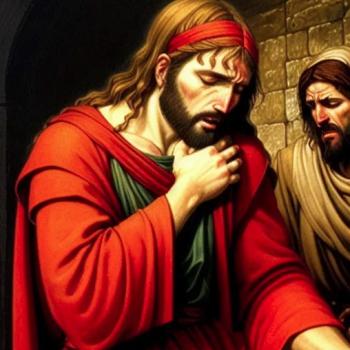Deconstructing my own life was pretty easy. I drank alcohol. Lots of alcohol. It tore my life apart, left me with nothing, and damn near killed me. The process that followed was more difficult but provided a way of life that was doable. Recovery was one of the more difficult ventures that I have ever been a part of. It hasn’t been the most difficult.
Deconstructing my own faith has been, by far, the most difficult and taxing activity that I have put my mind to. It takes focus. Self awareness and self reflection are a necessary part of the exercise. Holding onto deeply held beliefs lightly is necessary to find release from theories, beliefs and values that I have held for so long. Willingness to give up on something that I have devoted my life to, was a necessary sacrifice in the process.
Deconstruction has a purpose. When someone tears down a house, there is an end goal of building something new, something better, and something that will sustain. When a road is torn up, the end result is a better, wider road with more strength to withstand the elements. The same is true in faith deconstruction. The ultimate ‘goal’ of deconstruction is reconstruction of something new, different, and hopefully better.
Ian Harber, who deconstructed his own “progressive Christianity,” says “the goal of deconstruction should be greater faithfulness to Jesus, not mere self-discovery or signaling one’s virtue.” Ivan Mesa, editor of Before You Lose Your Faith: Deconstructing Doubt in the Church, similarly writes: “Deconstructing can be the road toward reconstructing—building up a more mature, robust faith that grapples honestly with the deepest questions of life.”
Sacrifices to Give
The church was something that I had devoted my entire life to. I gave up my college degree to a title that would serve the church. I moved my family hundreds of miles away from people we knew, for a chance to work in a church. Years of working in an elder led environment turned incredibly sour and I gave up 3 years of my life that were embroiled in regret and pain. I had hope for the church, that it would one day be better. One day, I always thought that it would become what Jesus had said it should or could be. That never happened. I don’t know that it ever will, but I had to sacrifice my dream of helping to make it a reality.
Theology is important to a local church Pastor. It’s really the only ‘goal’ that the Pastor can possess. In a business environment, there are goals that are monetary or value driven but in the church world, there is only theology. Becoming a skillful orator of theology was something that I had to work at. In the end, I had to sacrifice my theology, or at least be willing to put it on the sacrificial table if necessary, so that I could deconstruct my own faith. I had to be willing to put the deepest tenets of the faith to the test. Is Jesus really God? Is God supreme? Did he create everything? Does God even exist? These were all questions that I had to be willing to accept different answers than my previous experience had led me to.
Spiritual practice and discipline needed to be called into question. Since my early days of working at a Christian Camp, I had developed a routine practice of reading the bible daily and spending time in prayer. Deconstruction demanded that I cease this practice for a search of something different, hopefully something better. I am a creature of habit and this was more difficult than I imagined it would be. Getting up early and being a good Christian was clearly part of my routine and value system.
Moralistic thinking and practice had to be questioned. Why did I do (or not do) the things that I chose? I did them because they were familiar to me. The actions I didn’t take were a choice against sin. The motivations behind why I chose to do or not do certain things were certainly distorted, and I had to have clarity as two why I chose moralism.
Rock Bottom and Distortion
During my deconstruction, I entered into a very bleak reality. I had come to the point in the deconstruction where everything was torn apart, laying in shambles all over the place, and nothing seemed very solid to me at all. I found myself not sure of anything really and wanted to find a handhold to grasp onto. If you have ever experienced the terrifying reality of free falling, even a short distance, you would understand what emotionally I was going through. I was completely free falling. There was nothing to grasp, no realities that were true, and a harsh distortion began to befall me.
I no longer identified as the person that I had become as part of the conservative Christian community that I was ‘raised’ in. From an early age, I was taught the truths of legalism. Conservative values were instilled upon me as gospel truth. The church was to be revered and held high. To be a Pastor of one of them was to be esteemed and that put me on the track that I eventually accomplished. I learned to lead in one of the very schools of legalism that I was now renouncing. My identity was in shambles. A warped mess. And it would only get more distorted once I hit the very bottom.
I remember being in recovery and trying to vocalize the spiritual questions that I was having internally. I remember saying to people that I ‘wasn’t sure if God existed or not.’ This had to be a shocking statement coming from a previous Pastor who was supposed to be doubly sure that God was real. It all came to a head while I laid in bed one night discussing these issues with myself. I was driving myself crazy trying to determine what was ‘true’ or what was ‘false.’ It then dawned on me. I had reached the end of the deconstruction of all that I had worked so hard to build through the years. My life was an utter disaster. My spiritual life was nonexistent. My slate was completely blank, with a few mortar shells and fragments laying around. I could begin to reconstruct the reality that I needed to cope with life on life’s terms. Rock bottom as it relates to deconstructions was a difficult place to be, but a necessary place to begin to move upward and forward.
The Right Foundation
If you talk to a home builder, you quickly discover that one of the most important parts of the home building process is making sure that the foundation is correct. It has to be square, level, and strong. If any of these attributes are lacking or not correct, the entire house is in jeopardy once the construction on top of the foundation begins. The cornerstone of the house (or the corner angle) is also critical to making sure that the house will withstand the elements of weather, human traffic, and water drainage. If the corner angle is not set correctly, literally the entire house could come tumbling down.
As I laid in bed that night discovering my blank slate, I come to the realization that my foundation and cornerstone needed to be better than it had been prior to deconstruction. It needed to be slowly and steadily crafted, so that when the storms of life would come, I wouldn’t be sent spiraling back down the alcoholic path that I had wound up on. My corner angle needed to be sharp and in tune with the rest of the foundation, for if it wasn’t I was to find myself at rock bottom again, with the same questions and with possible worse life circumstances (I wasn’t sure at the time that this was possible.)
So I began a painstaking journey. With a slow and steady brick laying hand, I found the foundation that was studied, experienced, and crafted, all at the same time. I questioned each brick that I laid in the foundation, sometimes for days, to make sure that it was a brick that I wanted as a part of my new foundation. I examined each statement that I ultimately accepted as truth with great care. There were very few outside voices that I would allow to speak into my reconstruction. The voices from the past seemed so loud at times that I was certain that I wasn’t getting the right bricks in the right spaces at times. Withstanding these attacks or blasts from the past was a necessary part of my reconstruction.
A Foreman was Needed
Building a house all by yourself is quite difficult, I would imagine. Rebuilding a foundation of a life is nearly impossible when attempted in isolation. I had a few friends and trusted people around me during the early days of reconstruction. One such friend, named Kermit, whom I was living with at the time of my deconstruction and early reconstruction, continued to give me feedback on the bricks that I was placing. He was careful to not criticize my questioning, but intent on cultivating my ability to discern. He would ask great questions about how I arrived at a conclusion. He didn’t question the conclusion outright but instead helped me develop a process of determination. Selecting the correct bricks was more about the process of deciphering which one was the best and less about getting it ‘right.’ Kermit rightly pointed out multiple times that if I could learn the art of discernment, then I could swap bricks in and out of my foundation for better ones as life vaulted along.
Kermit was my Foreman during my early reconstruction days. He double checked the bricks that I was laying, made sure that I was comfortable with how the project was coming along, and offered his advice and opinion as I became more comfortable with discerning. I’m grateful for a Foreman as I know many people do not have this luxury.
A Life Long Builder
Today, I can say that I have a strong developing foundation. I am sure of the few things that I believe. Not so sure that I will argue with people about them, but sure enough that I can strongly state my case within my own heart and mind. The values that I hold to are pretty simple and offer an answer at almost any crossroad in life. My spiritual life is stronger than it ever has been and yet is anemic compared to what most Pastors would prefer their parishioners would engage in. Attendance in a local church is sporadic at best, and when I do go, I struggle to engage the biblical arguments and theological teachings espoused as ‘vital’ to a Christian. I probably am not measuring up to the person next to me in the pew. Good thing one of my values is not to compare myself to the next person. My family life is a priority and comes before everything else. It is the solid foundation that I lacked years ago, which led me into a deep tailspin that almost killed me.
I’m a life long builder. The good news today is that I am never quite finished. And I know God is not finished with me yet, either.












